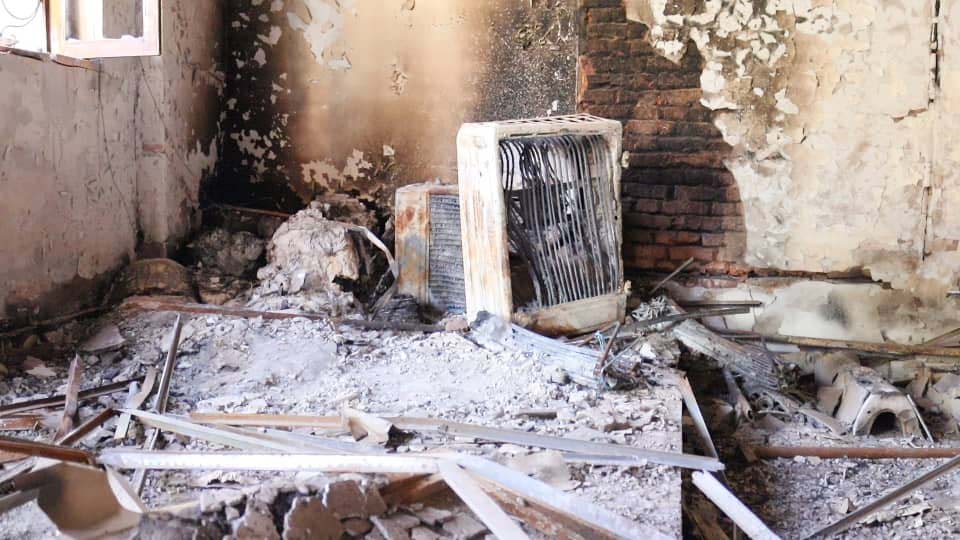Sudan capital witnesses fierce fighting again, airstrikes reported from West Kordofan

Homes and shops in Burri in Khartoum destroyed by bombing this week (Photo: Saeed Abdelmajeed)
At least 12 people were killed when missiles hit a poor neighbourhood in Omdurman on Saturday. The Rapid Support Forces (RSF) launched a new attack on the El Shajara military complex in southwest Khartoum yesterday. Northern Jebel Aulia was bombed. The Sudan Armed Forces (SAF) reportedly carried out air strikes on RSF targets in West Kordofan. The SAF withdrew its soldiers from six bases in the state.
The Resistance Committees Coordination of Karari in northern Omdurman reported in a statement on social media yesterday that eight men and four women were killed, and more than hundred others were injured when five shells fell on the poor El Sawra 15 neighbourhood, known as Zagalona* on Saturday.
The wounded were transferred to El Nau Hospital in El Sawra 8, the only health facility in the neighbourhood that is still operating. “The hospital has become more than overcrowded,” a post on X (formerly Twitter) stated. “There are wounded everywhere. There are far from enough beds, and many have to lie on the ground in the wards or corridors.”
The Democratic Lawyers Front of Lawyers accused the RSF of “committing the crime”. In a post on their Facebook page, the group condemned “artillery shelling in residential neighbourhoods” and called for the prosecution of the perpetrators.
Southern Khartoum
People living in southwest Khartoum yesterday told Radio Dabanga about heavy battles at the armoured corps in the El Shajara military compound on Sunday morning, SAF soldiers claimed they repelled the attack after six hours of heavy fighting.
On Sunday morning, paramilitaries of the RSF posted videos from inside the armoured corps claiming their control of the main gate, while SAF soldiers at the place published a video clip saying they seized several RSF tanks.
A resident of the Khartoum’s ‘Southern Belt**’ told Radio Dabanga that the RSF launched artillery attacks on SAF armoured vehicles from positions in the belt since dawn on Sunday. The shelling continued until noon.
Jebel Aulia, which is the most southern locality of Khartoum, witnessed “the most violent battles of its kind so far”.
Sources reported airstrikes in conjunction with artillery shelling from the Jebel Aulia military base on RSF targets in the northern part of Jebel Aulia.
Water, electricity
The El Fitihab Resistance Committees in southern Omdurman reported that the neighbourhood has been living “in complete darkness for two weeks” after the RSF bombed the Banat Power Station. “The power outage has led to the interruption of laboratory work, damage to medicines, and poor communication and internet services,” the joint resistance committees said in a social media statement yesterday.
On Saturday evening, the Zain communications network was cut off in large parts of Omdurman.
In Khartoum North, the water supply has been restored to parts of the many neighbourhoods of El Haj Yousef after an interruption of six months.
Residents of the western parts of Khartoum North and in Burri in northeast Khartoum complain about water outages for about seven months.
West Kordofan
A warplane reportedly carried out air strikes on the areas of Abu Zabad near the South Kordofan border and El Mangayat, some 45 kilometres east of the In West Kordofan capital El Fula on Sunday morning. There were no losses of life and property, sources said.
Military sources reported air strikes on targets in North and West Kordofan on Sunday, but it was not possible to independently confirm the report.
People in Babanousa reported the formation of a committee of native administration*** leaders, notables and youth on Friday, in order to protect the town after the command of the 22nd Division in Babanousa withdrew the soldiers from six army bases in the state (El Taboun, Belef, Nama, Fama, Kharasana, and Balila).
They said that the West Kordofan police chief also withdrew his and his representatives from the town’s security emergency room.
On Monday last week, the RSF briefly took control of the oilfield and airport of Balila. Sudan War Monitor reported that they executed 14 prisoners of war (POWs) after the attack.
In end October, the Sudan People’s Liberation Movement North under the leadership of Abdelaziz El Hilu (SPLM-N El Hilu) attacked Lagawa town in eastern West Kordofan. The commander of the 22nd Infantry Division in Babanousa told community leaders at the time that the SAF would continue to secure the area, as “The security of the people is a red line that cannot be tolerated”.
* Zagalona means ‘they pushed us aside’, which refers to the forced transport in the 1990s of southern Sudanese and Nuba displaced dwelling in the centres of Omdurman, Khartoum, and Khartoum North, to camps outside these cities. The areas were ‘violently restructured’ in the first half of this century, and integrated in the continuously expanding residential areas of greater-Khartoum.
** Khartoum’s Southern Belt is part of the periphery of the capital inhabited by people earlier displaced by wars in Sudan’s western and southern regions, South Sudanese refugees, and impoverished farmers from various parts of the country who lost their lands to banks after they went bankrupt.
*** The Native Administration was instituted by British colonial authorities seeking a pragmatic system of governance allowing for effective control with limited investment by the rulers. State-appointed native administration leaders executed policies, collected taxes, and mobilised labour on behalf of the central government. According to the Darfur Bar Association, the Native Administration during the rule of dictator Omar Al Bashir (1989-2019) did not represent the real community leaders.











 and then
and then